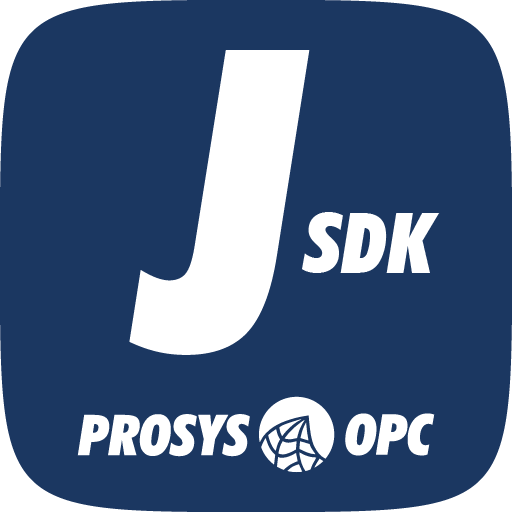
OPC UA
SDK for Java
Certified multiplatform OPC UA development with Java
Technical Details
Prosys OPC UA SDK for Java has been certified by the OPC Foundation to be OPC UA compliant. The OPC Foundation’s Certification and Compliance program exists to help members develop and provide high quality products that meet minimum operability requirements. OPC Certified products are:
- Compliant with the OPC specifications
- Interoperable with other OPC products from other vendors
- Robust, reliable and able to recover from lost communications, etc.
- Usable, by following universally accepted best-practices
- Efficient in managing resources (CPU, memory, disk space etc.)
Release History
General Features
Prosys OPC UA SDK for Java supports OPC UA version 1.05 and earlier, including the following features
Transport Protocols
- UA-TCP UA-SC UA-Binary
- HTTPS UA-Binary
- PubSub UA-UDP UADP
- PubSub MQTT UADP
- PubSub MQTT JSON
Security Policies
- Basic128Rsa15
- Basic256
- Basic256Sha256
- Aes128-Sha256-RsaOaep
- Aes256-Sha256-RsaPss
Information Models
- Data Access
- Alarms & Conditions
- Historical Access
- Companion Specifications
- Custom Models
Java Versions
- Java SE 6*
- Java SE 7*
- Java SE 8
- Java SE 11
- Java SE 17
- Java SE 21
* Up to version 4.x Client Server Edition only
Client SDK Specific Features
Prosys OPC UA SDK for Java Client Edition implements the necessary OPC UA client side infrastructure, enabling you to concentrate on your core competence, including
- Connection & Session Management
- Subscription Management
- Address Space Management
- Security Certificate Management
The Client SDK defines a pure Java style interface to OPC UA service calls. Special effort has been put to the design of the Client SDK objects to make it intuitive and easy to use, also in various scenarios. The Client SDK objects enable you to design your own application logic to actually handle the data available from the OPC UA servers with minimum effort.
The Client SDK includes a tutorial and a sample client application which demonstrate the usage of the Client SDK and give you a quick start to your own OPC UA client application development.
Supported OPC UA Profiles
- UA Generic Client Profile
- UA Data Access Client Profile
Supported OPC UA Facets
- Base Client Behaviour Facet
- Core Client Facet
- Reverse Connect Client Facet
- AddressSpace Lookup Client Facet
- Attribute Read Client Facet
- Attribute Write Client Facet
- Complex Data Types
- DataChange Subscriber Client Facet
- DataAccess Client Facet
- Diagnostic Client Facet
- Discovery Client Facet
- Subnet Discovery Client Facet
- Event Subscriber Client Facet
- File Access Client Facet
- Global Discovery Client Facet
- Method Client Facet
- Multi-Server Client Connection Facet
- Node Management Client Facet
- Notifier and Source Hierarchy Client Facet
- Alarms & Conditions
- Historical Access
- Advanced Type Programming Client Facet
- Auditing Client Facet
- Redundant Client Facet*
- User Token – User Name Password Client Facet
- User Token – X509 Certificate Client Facet
- User Token – Issued Token Client Facet
- User Token – Issued Token Windows Client Facet
Server SDK Specific Features
Prosys OPC UA SDK for Java Server Edition provides the basic infrastructure for developing a full-fledged OPC UA server. It enables you to add a complete OPC UA server to your application with minimum effort by providing an implementation of all the necessary services and data types according to the OPC UA specifications.
Implemented Services
- Security Certificate Management
- Session Management
- Subscription Management
- Node Management
- Attribute Management
- Event Management
- Method Services
- Alarm Services
- History Services
The Server SDK includes a tutorial and a sample server application which demonstrate the usage of the Server SDK and give you a quick start to your own OPC UA server application development.
Supported OPC UA Profiles
- Standard UA Server Profile
- Embedded UA Server Profile
- Nano Embedded Device Server Profile
- Micro Embedded Device Server Profile
Supported OPC UA Facets
- Core Server Facet
- Reverse Connect Server Facet
- Base Server Behaviour Facet
- Attribute WriteMask Server Facet
- Documentation Server Facet*
- Embedded DataChange Subscription Server Facet
- Standard DataChange Subscription Server Facet
- Enhanced DataChange Subscription Server Facet
- Data Access Server Facet
- ComplexType Server Facet
- ComplexType 2017 Server Facet
- Standard Event Subscription Server Facet
- Address Space Notifier Server Facet
- Auditing Server Facet
- Method Server Facet
- State Machine Server Facet
- File Access Server Facet
- Node Management Server Facet
- Client Redundancy Server Facet
- Redundancy Visible Server Facet*
- A & C Base Condition Server Facet
- A & C Address Space Instance Server Facet
- A & C Enable Server Facet
- A & C Alarm Server Facet
- A & C Acknowledgeable Alarm Server Facet
- A & C Exclusive Alarming Server Facet
- A & C Non-Exclusive Alarming Server Facet
- A & C Dialog Server Facet
- Historical Raw Data Server Facet*
- Historical Aggregate Server Facet*
- Historical Access Structured Data Server Facet*
- Historical Data AtTime Server Facet*
- Historical Access Modified Data Server Facet*
- Historical Annotation Server Facet*
- Historical Data Update Server Facet*
- Historical Data Insert Server Facet*
- Historical Data Delete Server Facet*
- Base Historical Event Server Facet*
- Historical Event Update Server Facet*
- Historical Event Insert Server Facet*
- Historical Event Replace Server Facet*
- Historical Event Delete Server Facet*
- User Token – Anonymous Facet
- User Token – User Name Password Server Facet*
- User Token – X509 Certificate Server Facet*
- User Token – Issued Token Server Facet*
- User Token – Issued Token Windows Server Facet*
* Requires application implementation
